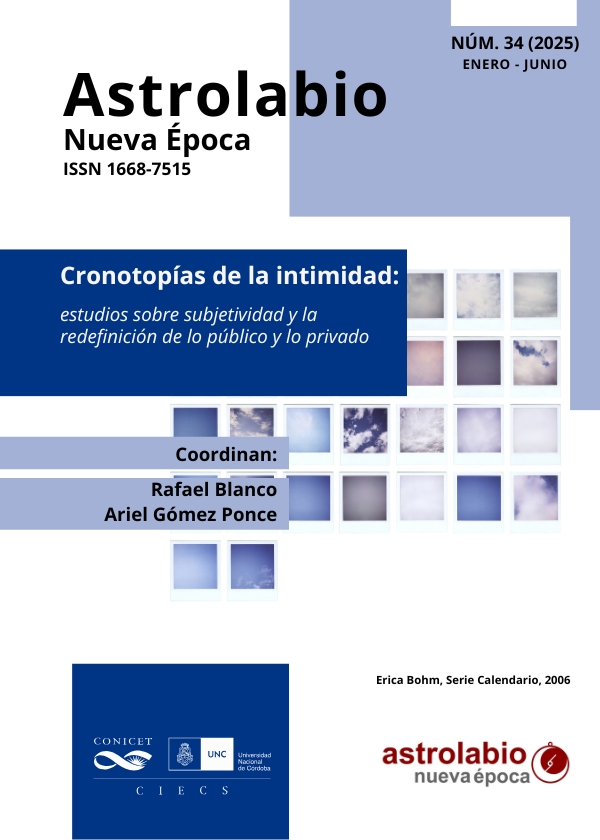Biography and Archive. A Lecture by Jorge Luis Borges as Transcribed by a Police Intelligence Agent
Main Article Content
Abstract
On May 28, 1970, Jorge Luis Borges delivered the conference “Junín and the Conquest of the Desert” in that city. Among the audience present, an agent of the local intelligence services listened, wrote and sent to his superiors a version of the lecture and his impressions, a singular record that is kept in the Archives of the Intelligence Directorate of the Police of the Province of Buenos Aires (DIPPBA).
The aim of the article is to inscribe the document on two levels: (1) to expose some notes and reflections on the narration of lives, biographical and autobiographical moments in the writing and literary aesthetics of Jorge Luis Borges that point to themes related to what was supposedly exposed in the conference; (2) to situate the document, the logics of the archive and the political context that surrounded it, and to put this in dialogue with the previous point. And, interweaving both, to analyze in methodological and analytical terms, the tense relations between biography, autobiography and archive.
Article Details
Section

This work is licensed under a Creative Commons Attribution-NonCommercial-ShareAlike 4.0 International License.
Astrolabio, Nueva Época está protegida bajo licencia Licencia Creative Commons Atribución-NoComercial-CompartirIgual 4.0 Internacional. La propiedad intelectual de los artículos pertenece a los autores y los derechos de edición y publicación a la revista. Los artículos publicados podrán ser usados libremente para propósitos científicos y académicos, siempre y cuando se realice una correcta citación de los mismos. Cualquier persona física o jurídica que desee reimprimir parte o la totalidad de algún artículo, deberá obtener permiso escrito de los editores de Astrolabio Nueva Época, quien lo otorgará con el consentimiento del autor.
How to Cite
References
ALIFANO, Roberto. (1996). El humor de Borges. Buenos Aires: La Urraca.
ARFUCH, Leonor. (2007). Vidas de escritores. En El espacio biográfico. Dilemas de la subjetividad contemporánea, pp. 157-176. Buenos Aires: Fondo de Cultura Económica.
ARFUCH, Leonor. (2008). Crítica cultural entre política y poética. Buenos Aires: Fondo de Cultura Económica.
ARFUCH, Leonor. (2013a). Memoria y autobiografía. Exploraciones en los límites. Buenos Aires: Fondo de Cultura Económica.
ARFUCH, Leonor. (2013b). “Identidad y narración: devenires autobiográficos”. Vertex, 108, 127-131.
ARFUCH, Leonor. (2018). La vida narrada. Memoria, subjetividad y política. Villa María, Córdoba: Eduvim.
BORGES Jorge Luis. (1974). Obras completas 1923-1972. Buenos Aires: Emecé.
BORGES, Jorge Luis (1986). Borges oral. Buenos Aires: Emecé - Editorial de Belgrano.
BORGES, Jorge Luis. (1989). Obras completas 1975-1985. Buenos Aires: Emecé.
BORGES, Jorge Luis. (1997). Textos recobrados 1919-1929. Buenos Aires: Emecé.
BORGES, Jorge Luis. (1998a). Prólogo con un prólogo de prólogos. Madrid: Alianza.
BORGES, Jorge Luis. (1998b). Textos cautivos. Madrid: Alianza.
BORGES, Jorge Luis. (1999). Autobiografía. 1899-1970. (Con Norman Thomas de Giovanni.) Buenos Aires: El Ateneo.
DE MAN, Paul. (1991). “La autobiografía como desfiguración”. Anthropos, 43, 113-118.
FUNES, Patricia. (2007). “Los libros y la noche. Censura, cultura y represión en Argentina a través de los servicios de inteligencia del Estado”. Dimensões, 19, 133-155.
FUNES, Patricia. (2010). Los que queman libros. Censores en Argentina (1956-1983). En Ernesto Bohoslavsky, Marina Franco, Mariana Iglesias y Daniel Lvovich (comps.), Problemas de historia reciente del Cono Sur. Volumen 1, pp. 303-325. Buenos Aires: Prometeo - UNGS.
MOLLOY, Silvia. (1977). “La composición del personaje en la ficción de Borges”. Nueva Revista de Filología Hispánica, 26-1, 130-140. Disponible en: https://www.jstor.org/stable/40298921 [consulta: octubre de 2003].
PIGLIA, Ricardo. (1979). “Ideología y ficción en Borges”. Punto de Vista, 5, 3-5.
PIGLIA Ricardo. (2018). Los casos del comisario Croce. Buenos Aires: Anagrama.
PROGRAMA DE GESTIÓN Y PRESERVACIÓN DE ARCHIVOS, COMISIÓN PROVINCIAL POR LA MEMORIA. (2015). “La DIPPBA va a la Universidad. El registro de la vida universitaria por la Dirección de Inteligencia de la Policía de la Provincia de Buenos Aires”. Aletheia, 6-11, 1-16. Disponible en: https://www.memoria.fahce.unlp.edu.ar/art_revistas/pr.6972/pr.6972.pdf [consulta: noviembre de 2023].
RODRÍGUEZ MARTÍN, María del Carmen. (2007). “Dramatis personae: érase una vez… Borges”. Taller de Letras, 40, 21-41. Disponible en: https://www.bibliotecanacionaldigital.gob.cl/visor/BND:267545 [consulta: noviembre de 2023].
SARLO, Beatriz. (1988). Una modernidad periférica: Buenos Aires 1920 y 1930. Buenos Aires: Nueva Visión.
SARLO Beatriz. (2005). La pasión y la excepción. Buenos Aires: Siglo XXI.
Documentos
Archivo DIPPBA (Dirección de Inteligencia de la Policía de la Provincia de Buenos Aires):
* Mesa A, Estudiantil. Legajo Nº 182. “Centro Universitario Junín-La Plata”. 1970.
* Mesa C, Comunismo. Varios. Legajo Nº 25 “Informaciones que se requieren para el normal funcionamiento del Departamento y la mesa respectiva”. 1957.
* Mesa C, Comunismo. Varios. Legajo Nº 254 “Personas que establecieron contactos con embajadas de países comunistas”. 1964.
* Mesa Doctrina. Legajo Nº 43 “Anteproyecto función y actividades de la DIGPBA”, s/f.
Diario La Verdad, Junín, Provincia de Buenos Aires:
* “Jorge Luis Borges habla de Junín”. 28 de mayo de 1970.

